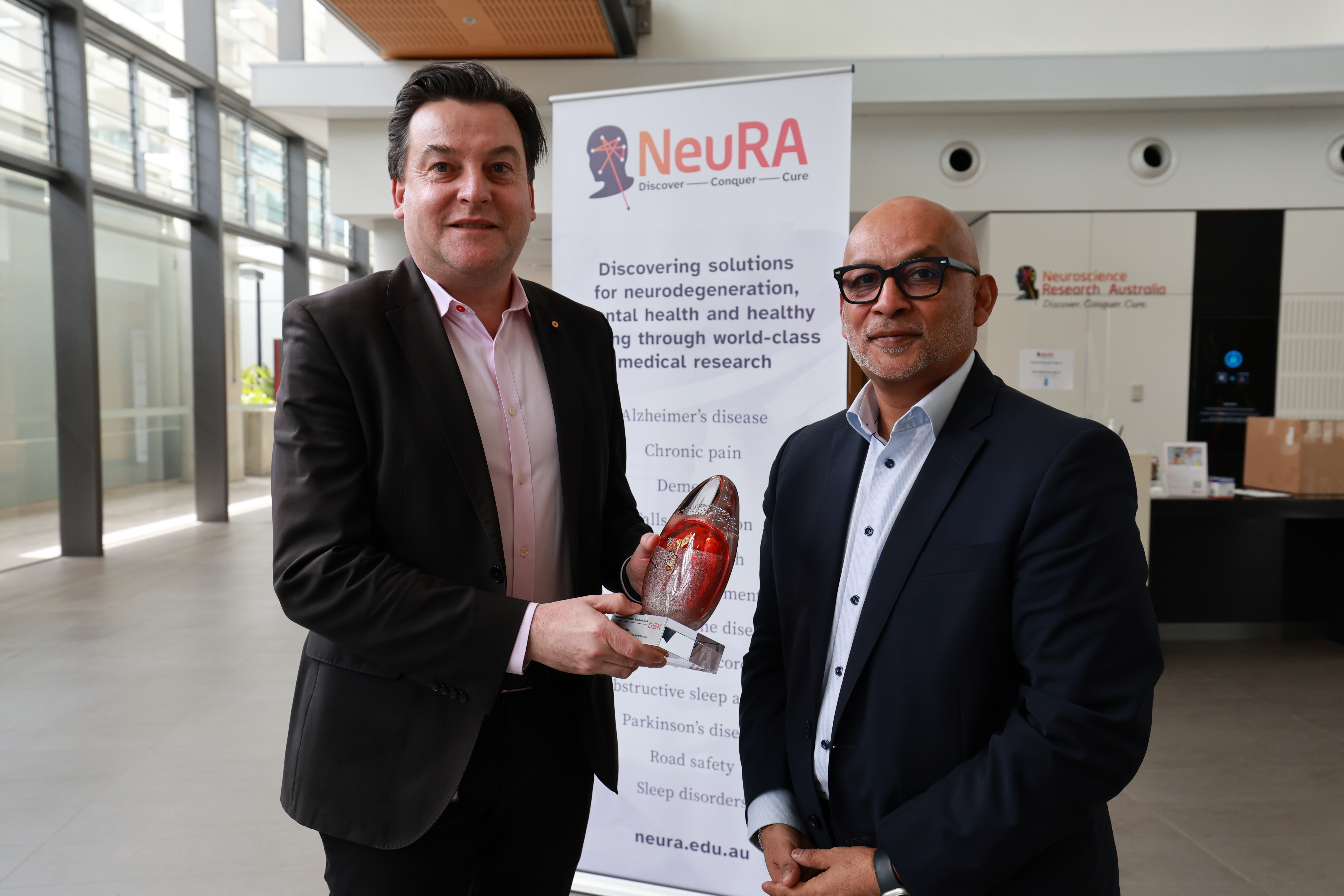The GSK Award for Research Excellence is one of the most prestigious awards available to the Australian medical research community. It has been awarded since 1980 to recognise outstanding achievements in medical research and facilitates career development with potential importance to human health and Australian research.
It was first presented as the Wellcome Australia Medal and then as the Glaxo-Wellcome Medal before receiving its current name.
We are delighted to support the Australian health research community with the GSK Award for Research Excellence (ARE).
The 2024 GSK ARE winner was announced at the Research Australia Health and Medical Research Awards.
Decades worth of groundbreaking brain disease research wins Australian scientist the 2024 GSK Award for Research Excellence

Professor Matthew Kiernan – Chief Executive Officer and Institute Director at Neuroscience Research Australia (NEURA) and Scientia Professor of Neuroscience at the University of NSW - has won the prestigious 2024 GSK Award for Research Excellence for his work in neurodegenerative disease, particularly in motor neurone disease (MND) and frontotemporal dementia.1
An internationally renowned neuroscientist, Professor Kiernan is known for introducing techniques enabling scientists to study how nerve cells communicate with one another. His discoveries have improved global understanding of the mechanisms of neurodegenerative disease, and helped scientists to identify new therapeutic targets.
Accepting the accolade, Professor Kiernan says he is hopeful that conditions like dementia will be manageable within the next two decades, with clinical trials of new innovative therapies now underway across the globe as a result of his work.
Professor Kiernan commented: “It’s an honour to be named the 2024 recipient of the GSK Award for Research Excellence and have our efforts recognised.
“It’s an exciting time to be working in neuroscience. For a long time, one of the key challenges facing neurologists was understanding how neurodegeneration begins in the brain. Our research has provided key information about the critical functional changes that occur prior to the onset of a neurodegenerative disease.
“We are now able to delineate between the normal function of the brain and the key mechanisms of disease. This new perspective is paving the way for innovative therapies and treatment options for conditions like MND and frontotemporal dementia.”.
Dr Bec Sheean, Director of Research and Programs at FightMND, said Professor Kiernan’s research has been critical to understanding more about MND – a condition affecting nerves in the body controlling movement and eventually leading to complete paralysis. Approximately two Australians are diagnosed with the condition daily and there are currently limited registered treatment options.2 The average life expectancy is 27 months from diagnosis.3
Dr Sheean commented: “Professor Kiernan is one of Australia’s leading MND neurologists and his research is not only helping to advance our understanding of this terrible disease, but also providing hope and opportunities for Australian patients to participate in clinical trials. On behalf of Neale Daniher and all the team at FightMND, we congratulate Professor Kiernan on receiving this prestigious award and know his work is making a difference for all people who are impacted by this condition. Research is the best way we can fight back against this disease and Professor Kiernan is championing efforts, paving the way for new and effective treatment options.”
Professor Kiernan’s work has also helped define a diagnostic criteria for neurodegenerative diseases and established consensus guidelines that have now been adopted by the World Federation of Neurology.
Professor Kiernan says he will use the $100,000 AUD grant accompanying the GSK Award for Research Excellence to establish a clinical fellowship to underpin the development of a national clinical trials program. This will improve patient access to new trials and enable more robust assessment of clinical data.
Professor Kiernan added: “Further developing our national clinical trials program is a major priority for our team. This grant provides an important opportunity to establish a clinical fellowship focused on translational research and precision medicine approaches for all patients across Australia.”
Dr Alan Paul, Executive Country Medical Director at GSK Australia, said GSK is proud to continue supporting Australian research.
Dr Paul commented: “We are delighted to welcome Professor Kiernan to the distinguished list of GSK Award for Research Excellence alumni members. His outstanding work deserves recognition – he really is paving the way when it comes to neurodegeneration research. We are thrilled to support Matthew and his team, as they continue their endeavor to improve health outcomes for patients locally and globally.”
The 2024 GSK Award for Research Excellence was presented to Professor Kiernan at Research Australia’s Health and Medical Research Awards in Melbourne. The award is one of the most prestigious and longstanding independent awards open to the Australian medical research community. Established in 1980, the award has since provided more than $3 million* to local researchers since its inception.
References:
- NeuRA. (2024). Motor Neurone Disease and Frontotemporal Dementia. Available at: https://neura.edu.au/research/research-expertise/motor-neurone-disease-and-frontotemporal-dementia
- MND Australia. (2024). What is motor neurone disease? Available at: https://www.mndaustralia.org.au/mnd-connect/what-is-mnd/what-is-motor-neurone-disease-mnd
- FightMND. (2024). What is MND. Available at: https://fightmnd.org.au/about/what-is-mnd
